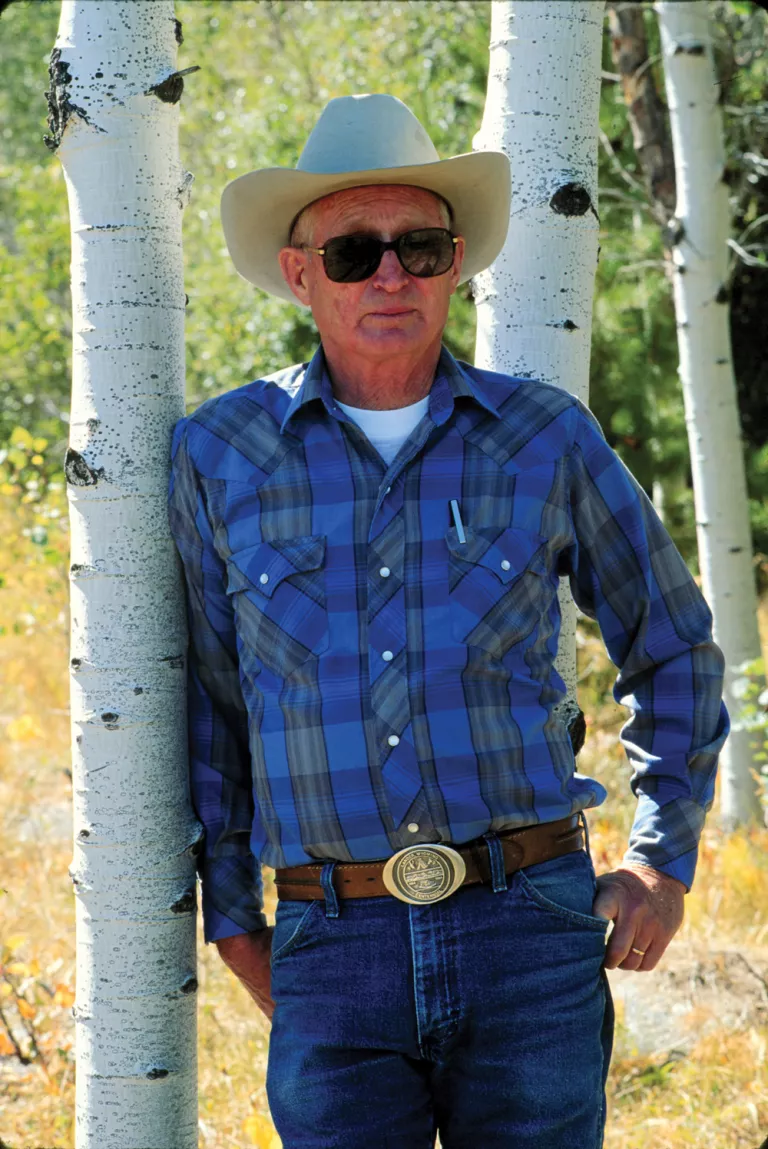Tom Bell, Visionary, Advocate, Mentor, Fighter, Friend

Photo courtesy of Mike McClure/High Country News
Tom Bell, an early and influential voice for wilderness and wildlife in the Northern Rockies, died in Lander, Wyoming, on August 30, 2016, at the age of 92.
I first met Tom shortly after graduating from Colorado State University with a degree in wildlife biology in 1973. Tom had agreed to hire my future wife, Joan Nice, and me to help him run his environmental advocacy biweekly newspaper. The pay was only $300 a month. But that didn’t bother us. We packed our worldly belongings in Joan’s car and showed up at Tom’s doorstep to join him in the fight to expose and hopefully prevent the unscrupulous exploitation of the West’s natural resources.
I had written a couple of articles for High Country News, so I was not totally unfamiliar to Tom. Joan had some experience, too. She was a freelance writer and editor based in Aspen, Colorado. But Tom was taking a huge gamble hiring a couple of 20-somethings who had never lived or worked in Wyoming. How would we possibly go toe-to-toe with coal barons, oil and timber executives, entrenched politicians, and powerful ranchers and miners?
Tom took Joan and me under his wing and taught us about the complex regional environmental issues. He introduced us to a close network of conservation advocates in the Northern Rockies. In many ways, during those first few years, he became almost a second father to me. When he would shoot elk, we would get a share of the meat. When we needed to borrow a truck or chainsaw to put in the winter’s supply of wood, Tom was there to help us cut and stack it. When we needed a free couch in Casper or Sheridan, Tom introduced us to friends who welcomed us as family.
To me, Wyoming was a dream come true—the Alaska of the Lower 48. Wyoming was home to the first national park (Yellowstone), first national monument (Devils Tower), and first national forest (Shoshone). The state was mostly unprotected wild public lands with huge herds of free-roaming pronghorn, mule deer, elk, and bison. It was 49th in population (322,000 people total), a state where there were more cows than people. Giant cutthroat trout were easy pickings for even a novice fly fisherman like me. I could launch my canoe on a free-flowing river right outside the front door of my cabin. Golden eagles, moose, and coyotes were all around.
What Wyoming lacked at the time was a vibrant citizen conservation movement to defend this spectacular wilderness. But, a few years before we came, Tom Bell had jumped into this vacuum. He quit the state Game and Fish Department over its refusal to protect wildlife from political interference and then started the Wyoming Outdoor Coordinating Council (later shortened to Wyoming Outdoor Council) and High Country News to establish a public voice and a citizens’ lobby for protecting the state and the region he loved. His voice in the wilderness and personal sacrifice attracted dozens, then hundreds, then thousands of followers.
Tom had no patience for those who put personal or corporate profit above the public interest when managing public lands. His personal sacrifices to keep High Country News and the Wyoming Outdoor Council afloat are legendary. He sold his ranch—literally—to keep HCN's voice alive. For those on the side of conservation, there wasn't a more loyal and trusted ally. For those who would poison eagles, build illegal fences, clearcut our national forests, and dry up rivers, there was no fiercer and effective critic.
In those early years, I was astounded by the crazy schemes to transform this wilderness paradise into an energy colony for the rest of the country. Near Pinedale, the Atomic Energy Commission wanted to use nuclear bombs to frack tight shale beds to release natural gas. Along the Green River in southwestern Wyoming, there was a proposal to divert water across the Continental Divide to feed giant coal-fired power plants. Another plan called for tapping groundwater and mixing it into coal slurry that would be shipped to Arkansas. National forests were being cut at a rate that greatly exceeded sustained yield in order to supply local timber mills that were sized for forest liquidation. Next to Yellowstone National Park, geothermal energy developers wanted to develop power plants that would not only pollute the park, but also potentially dry up the world-famous geysers. There were even plans to lease and drill for oil in designated wilderness. Promoting every one of these crazy schemes was Wyoming’s all-powerful Republican governor Stan Hathaway. It seemed like the only dissenting voice was Tom Bell, who was dismissed as a crank standing in the way of progress.
Well, as Margaret Mead told us all, “Never doubt that a small group of thoughtful, committed citizens can change the world; indeed, it’s the only thing that ever has.” Within a decade, the onslaught had been headed off. The Green River was never sent across the divide. The nuclear fracking plan was abandoned. The slurry pipeline was never built. The oversized timber mill was shut down, and the high-altitude basins it sought to exploit were designated as wilderness. Most of the power plants and gasification plants were never built. Wyoming passed tough industrial-facilities-siting legislation, a strong strip-mine reclamation law, and tough clean-air standards to prevent sulfur pollution from power plants. Plans to exploit geothermal power just outside Yellowstone were dropped. All oil and gas leasing in designated wilderness was permanently banned. Governor Hathaway was discredited and replaced by a moderate Democrat, Ed Herschler, who signed the reforms and safeguards that Hathaway had railed against.
In an open letter published in High Country News, Tom wrote of Hathaway,
But lowly though my position, I believe I have had some small influence, even on him. If he represented the people of Wyoming as they are, I like to think I represented the people as they may be. I think I speak for many who cannot speak for themselves.
Some of them are yet unborn who will have to exist in a world which we made for them. If their lives are blighted by air they cannot breathe, water they cannot drink or land upon which they cannot exist, then I think we must take the blame. . . .
Wyoming is a conservative state—sometimes too conservative for its own good in a fast-changing world. Many of us still believe a handshake and a word are as good as a written document. That won't do when you are dealing with an impersonal board room back in New York City, especially when the directors have to deal in turn with stockholders whose only interest is the dividend check.
I do not mean to be arrogant or egotistical when I call the governor's hand on some matter, though I am sure some believe so. I certainly have not become rich by my endeavors, and I believe I have as many enemies as friends.
Sorry to say to my detractors, so long as I live, I will continue to call the shots as I see them. I have been a maverick and a gadfly all my life, and like many Wyomingites, I am too old to change now.
Tom is no longer with us, but his fighting spirit lives on. Wherever a citizen stands up to fight for environmental justice, wilderness, wildlife, free-flowing rivers, public access, and continued public ownership of public lands, there you will find Tom Bell. If you stand on top of the Oregon Buttes and look across 100 miles of the Red Desert and don’t see a single oil rig or uranium pit, you can thank Tom Bell and those he inspired to carry on the fight. Joan and I are proud to be among the many people who dedicated our lives to the work he started. May there be many more generations to follow in his footsteps.
 The Magazine of The Sierra Club
The Magazine of The Sierra Club



